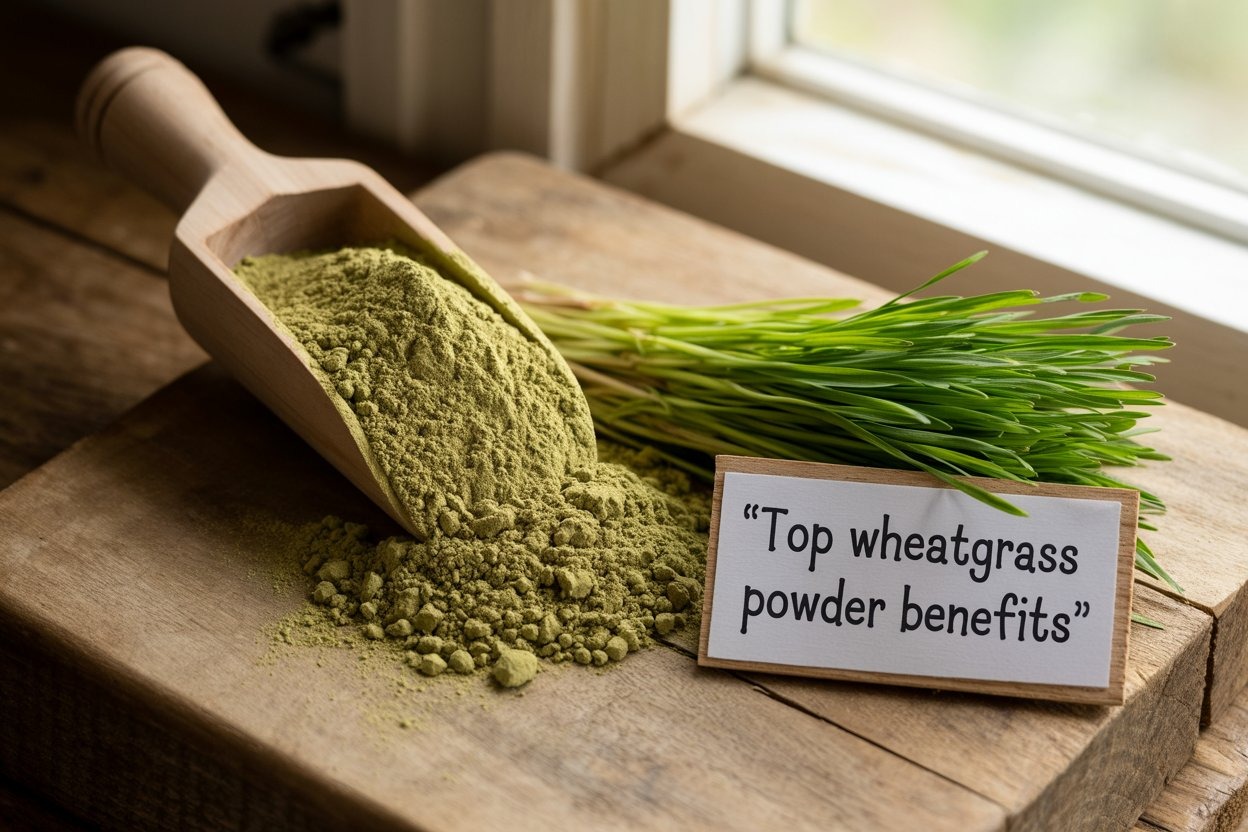What Is Wheatgrass Powder?
Wheatgrass powder is celebrated as a powerful plant-based superfood, prized for its impressive range of health benefits. It is derived from the tender young shoots of Triticum aestivum (common wheat) and has been used in natural healing systems like Ayurveda and traditional folk medicine for centuries.
One of the most commonly highlighted wheatgrass powder benefits is its extraordinarily high chlorophyll content. Interestingly, chlorophyll shares a nearly identical structure with haemoglobin—the oxygen-carrying protein in our blood. Because of this, chlorophyll is often referred to as “green blood”, and is believed to support oxygenation, detoxification, and overall vitality.
Wheatgrass is also rich in a spectrum of nutrients including antioxidants, enzymes, amino acids, vitamins, minerals, flavonoids, alkaloids, and tannins—all of which contribute to its many reported health benefits. These include supporting immunity, aiding natural detoxification, and fighting harmful bacteria.
In Ayurveda, wheatgrass powder is traditionally used to address acidity, colon inflammation, low kidney function, and even wound healing. Folk remedies also recommend it for easing colds, coughs, fevers, joint pain, and chronic skin issues.
Top Wheatgrass Powder Benefits
Here are the most notable wheatgrass powder benefits that health-conscious individuals and researchers are paying attention to:
Aid in Healthy Digestion
Wheatgrass has enzymes that help your body break down food and absorb nutrients to promise good healthy digestion. Drinking wheatgrass juice may also help detoxify your system, leading to reduced bloating, gas, and stomach upset.
May Limit Chemotherapy Side Effects
According to WebMD, one of the newer benefits of using wheatgrass powder is that it has been known to reduce chemotherapy side effects. Clinical research states that the intake of wheatgrass juice reduces the dose frequency requirement and has a lower risk of myelotoxicity (bone marrow damage), thanks to its protective effects.
Improves Symptoms of Ulcerative Colitis
According to a 2002 Israeli study, wheatgrass juice reduced the discomfort associated with ulcerative colitis, a debilitating inflammatory bowel disease. It improved patients’ overall symptoms and decreased rectal bleeding over the course of the 4-week trial.
Helps Regulate Blood Sugar
Wheatgrass may be useful in controlling blood sugar levels, according to research on animals. When given wheatgrass juice, diabetic rats’ blood glucose levels dropped and their insulin levels improved, indicating that wheatgrass juice may help manage diabetes.
May Lower Cholesterol Levels
In animal studies, wheatgrass significantly reduced LDL (bad) cholesterol and triglycerides, with effects similar to popular statins like atorvastatin. Though more human studies are needed, the early findings are promising for heart health.
Reduces Inflammation
Wheatgrass contains chlorophyll, which has potent anti-inflammatory effects. Studies on cells and animals demonstrate that it can lessen inflammation and swelling. Chronic diseases like cancer, heart disease, and arthritis may be less likely as a result.
How to Use Wheatgrass Powder
- Morning Shot: Mix 1 tsp of wheatgrass powder in 100ml water and drink on an empty stomach for maximum detox benefits.
- Smoothies: Add it to your green smoothies for a nutrient boost.
- Juices: Combine with orange or lemon juice to balance the earthy taste.
- Soups or Broths: Stir into warm (not boiling) soups to preserve nutrients.
- Face Masks (Topical Use): Mix with honey or yogurt for a refreshing skin treatment.
Conclusion
Wheatgrass powder is a nutrient-rich superfood packed with enzymes, antioxidants, vitamins, and minerals that offer a wide range of health advantages. The benefits of wheatgrass powder are indisputable and include better digestion, healthier skin and hair, reduced inflammation, and even support for immunity and detoxification. It’s especially beneficial for preserving general health and treating ailments like arthritis. Including wheatgrass in your daily routine can be a modest but significant step in the direction of a healthier way of living.
